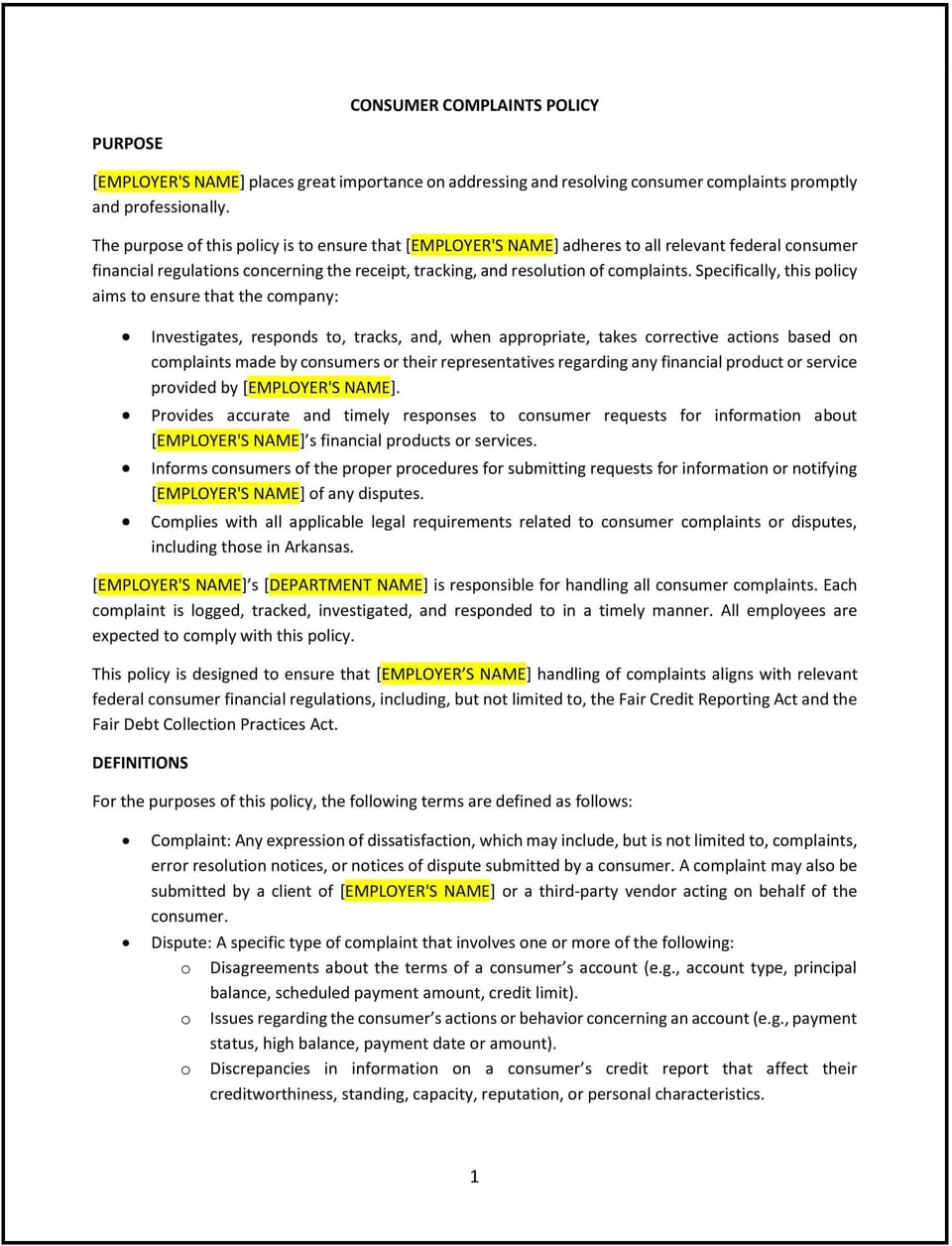Consumer complaints policy (Arkansas): Free template

Consumer complaints policy (Arkansas)
In Arkansas, a consumer complaints policy provides businesses with clear procedures for managing and resolving complaints from customers. This policy ensures consistent handling of feedback, promotes customer satisfaction, and protects the business’s reputation by addressing issues promptly and professionally.
This policy outlines how customers can submit complaints, the steps for investigation and resolution, and how the business uses feedback to improve. By implementing this policy, Arkansas businesses can strengthen customer relationships, support compliance with consumer protection laws, and enhance operational standards.
How to use this consumer complaints policy (Arkansas)
- Define complaint channels: Clearly specify how customers can submit complaints, such as through a designated email address, phone line, or online form.
- Establish response timelines: Set clear timelines for acknowledging, investigating, and resolving complaints to ensure timely and professional handling.
- Assign accountability: Outline the roles of employees or teams responsible for managing complaints and communicating resolutions to customers.
- Document complaints: Create a system for logging complaints, tracking their resolution, and identifying recurring issues to improve business practices.
- Use feedback constructively: Analyze complaint data to identify trends and implement changes that enhance customer satisfaction and operational efficiency.
Benefits of using this consumer complaints policy (Arkansas)
This policy offers several advantages for Arkansas businesses:
- Enhances customer satisfaction: Demonstrates the business’s commitment to addressing concerns and resolving issues, fostering trust and loyalty.
- Protects reputation: Provides a structured process for managing complaints, reducing the risk of public disputes or negative reviews.
- Supports compliance: Aligns with Arkansas consumer protection laws and federal regulations, ensuring fair treatment of customers and reducing legal risks.
- Improves operations: Uses complaint data to identify weaknesses in products, services, or processes, leading to continuous improvement.
- Promotes accountability: Establishes clear responsibilities for handling complaints, ensuring consistent and professional responses.
Tips for using this consumer complaints policy (Arkansas)
- Address Arkansas-specific considerations: Ensure the policy complies with state consumer protection laws, such as requirements for complaint handling or refund policies.
- Train employees: Provide training on complaint resolution techniques to ensure employees handle customer concerns effectively and professionally.
- Monitor complaint trends: Regularly analyze complaints to identify patterns and implement changes that address common issues.
- Communicate clearly: Ensure customers understand how to submit complaints and the process for resolving them, building transparency and trust.
- Review the policy regularly: Update the policy as needed to reflect changes in regulations, business practices, or customer expectations.
Q: How does this policy benefit the business?
A: This policy enhances customer satisfaction, strengthens the business’s reputation, and ensures compliance with Arkansas consumer protection laws by providing a structured approach to complaint resolution.
Q: What steps should the business take to handle complaints effectively?
A: The business should acknowledge complaints promptly, investigate thoroughly, communicate updates to the customer, and resolve the issue within the established timeline.
Q: How does this policy support compliance with Arkansas laws?
A: The policy aligns with state and federal consumer protection laws, ensuring fair treatment of customers and adherence to legal requirements for complaint handling.
Q: How can the business use complaint data to improve?
A: The business can analyze trends in complaints to identify recurring issues, address weaknesses in products or services, and implement changes that enhance customer experiences.
Q: What systems should the business use to track complaints?
A: The business can implement a complaint tracking system or CRM software to log, monitor, and analyze complaints, ensuring efficient handling and identifying areas for improvement.
This article contains general legal information and does not contain legal advice. Cobrief is not a law firm or a substitute for an attorney or law firm. The law is complex and changes often. For legal advice, please ask a lawyer.


